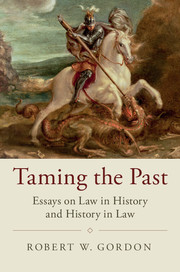Book contents
- Taming the Past
- Studies in Legal History
- Taming the Past
- Copyright page
- Dedication
- Contents
- Foreword
- Permissions
- Introduction
- Part I The Common Law Tradition in Legal Historiography
- Part II Legal Historians
- Part III History and Historicism in Legal History and Argument
- 10 Historicism in Legal Scholarship*
- 11 Critical Legal Histories*
- 12 The Past as Authority and as Social Critic: Stabilizing and Destabilizing Functions of History in Legal Argument*
- 13 Taming the Past: Histories of Liberal Society in American Legal Thought*
- 14 Originalism and Nostalgic Traditionalism
- 15 Undoing Historical Injustice*
- Index
15 - Undoing Historical Injustice*
from Part III - History and Historicism in Legal History and Argument
Published online by Cambridge University Press: 13 July 2017
- Taming the Past
- Studies in Legal History
- Taming the Past
- Copyright page
- Dedication
- Contents
- Foreword
- Permissions
- Introduction
- Part I The Common Law Tradition in Legal Historiography
- Part II Legal Historians
- Part III History and Historicism in Legal History and Argument
- 10 Historicism in Legal Scholarship*
- 11 Critical Legal Histories*
- 12 The Past as Authority and as Social Critic: Stabilizing and Destabilizing Functions of History in Legal Argument*
- 13 Taming the Past: Histories of Liberal Society in American Legal Thought*
- 14 Originalism and Nostalgic Traditionalism
- 15 Undoing Historical Injustice*
- Index
Summary
[This piece appeared in a collection of essays edited by Austin Sarat & Thomas Kearns, Justice and Injustice (University of Michigan Press, 1996). It turned out to be a droplet in a flood of books and articles on “transitional justice,” the ways in which countries that had recently emerged from communist or military or (as in South Africa) racial dictatorships into more democratic forms of rule chose to confront – or not to confront – their authoritarian pasts. My particular interest here was in the legal strategies that the new democracies employ to deal with their pasts and with the stories about the past that they tell to explain and justify those strategies. There is now a vast literature on these subjects. I can’t claim to have read it all, but the books that I have read that seem to contribute most of value to these debates are Ruti Teitel, Transitional Justice (2000), Martha Minow, Between Vengeance and Forgiveness: Facing History After Genocide and Mass Violence (1998), and most especially Mark Osiel, Mass Atrocity, Collective Memory and the Law (1999). There have also been some notable new contributions to the particular historical examples in this article: on the framing of the false “reconciliation” narratives after the U.S. Civil War, David Blight, Race and Reunion: The Civil War in American Memory (2001); and on postwar Germany’s management of its Nazi past, Norbert Frei, Adenauer’s Germany and the Nazi Past: The Politics of Amnesty and Integration (2010).]
- Type
- Chapter
- Information
- Taming the PastEssays on Law in History and History in Law, pp. 382 - 415Publisher: Cambridge University PressPrint publication year: 2017

